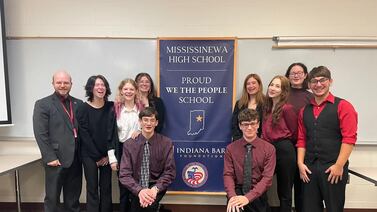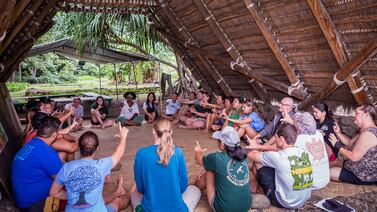I’m graduating next year with my degree in elementary education and was wondering if you have any advice for teacher interviews? Thanks! — Newer Interviewer
[Are you a teacher? Submit your question for our advice column here.]
Dear Newer Interviewer,
We need more teachers. Only 4% of all undergraduate degrees conferred are in education, according to Pew Research Center numbers for 2019-20.
I remember my early teacher interviews. I wanted to prove I had learned all there was to know about teaching. I showed up in my black suit and matching portfolio in hand, ready to take on the world. Nerves took over and I forgot everything.
I kept trying, and in time, I overcame those nerves, and I eventually managed to find a teaching position.
In the years since then, I have sat on interview panels for fellow teachers, taught my high school students how to interview, and hosted annual mock interviews for all my classes. The good news is it does get easier.
Interviewing next spring following the last two-plus years might seem daunting, but I appreciate your continued belief in the power of education and meeting the requirements to become a certified teacher.
Roles in elementary education are unique because interviewers will emphasize wanting to know your teaching philosophy, your pedagogical approaches, and how you will connect with parents and families.
Here are my quick tips for preparing for your elementary school teacher interviews.
The basics
- Collect all of your pre-employment documents. You will need an updated resume, cover letter, recommendations, and official transcripts.
Recommendation letters are top priority for interviewers. Be sure to give your references a minimum of two weeks to write your letters. Also, prepare supplemental documents such as portfolios and writing samples.
- Attend job fairs. The extroverted introvert in me loves job fairs. As an attendee, you can interact with multiple school districts in one setting and distribute your resume while networking with hiring managers.
Don’t be afraid to ask those hiring managers what perks their districts offer new teachers, such as a budget to purchase supplies or parking spot for the teacher of the month.
- Be prepared to discuss examples of your work experience. Potential employers will want to know how you resolve real-world teaching problems. An interviewer might ask you, “If I walked into your classroom during one of your lessons, what would I expect to see?”
Brainstorm problems you faced during your practicum and student-teacher experiences and how you solved them. The solutions you came up with are what will interest your interviewers. Make sure you provide examples whenever you assert you have a skill or can complete a particular task.
In interviews in the past, I’ve shared how I used differentiated instruction to address multiple learning styles. I prepared examples of student work and explained why I chose to offer a variety of products instead of paper-and-pencil tasks to assess student learning.
- Practice. Interviews can consist of panels with four or more interviewers. Some people find panel interviews overwhelming.
The key is knowing that the interviewers will be reading from a paper and scoring based on your answers. Try to prepare answers to common elementary teacher interview questions so you’re not surprised by an interviewer. Having answers in advance will help you remain calm under the stress of interviews.
Always be prepared to answer questions about behavior management plans and family communication.
What you might not know yet
- Consider extending student memberships through your first year. If you joined a teacher organization such as the education honor society Kappa Delta Pi, find out if they will allow you to extend your student membership through your first year as a practitioner.
Teacher organizations offer a plethora of resources for teaching and can sometimes host job fairs during their annual conferences.
- Talk to current and recently hired elementary teachers. Ask your references or other connections about their own teacher interview experiences. What questions were they asked, what went well, what do they wish they had done differently?
As teachers, we are used to relying on each other, and it’s good to start building that support network now.
- Prepare your own set of questions. Remember that you also have power as the interviewee and you should prioritize a school or district where you can see yourself being successful, supported, and respected.
I encourage you to ask interviewers tough questions such as: “how will you help me connect with a mentor beyond my first year?” “What supports are available to assist with following Individualized Education Programs and 504 accommodations to help ensure student success?” and “What building level supports are available for communicating with families?”
Teaching interviews are like most other interviews — they take practice and confidence in your skills and experience. If an interview doesn’t go your way, assess what went wrong and keep it in mind for the next one.
Keep confident there will be a next one.
Dr. Kem Smith is Chalkbeat’s first advice columnist. She is a full-time 12th-grade English teacher in St. Louis, Missouri. Submit your question to Dr. Kem via this submission form, and subscribe to How I Teach to receive her column in your inbox.
If you have a rebuttal or additional advice you’d like to share with Newer Interviewer, please email afterthebell@chalkbeat.org








